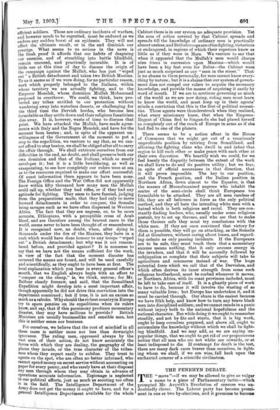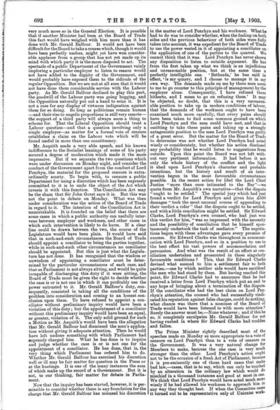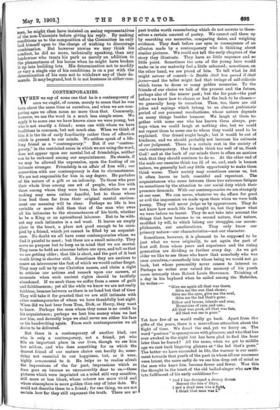THE PENRHYN DEBATE. T ""move "—if we may be allowed to
give so vulgar a name to a piece of Parliamentary tactic—which prompted Mr. Asquith's Resolution of censure was un- doubtedly clever. The Labour party has become promi- nent in one or two by-elections, and it promises to become very much more so in the General Election. It is possible that if another Minister had been at the Board of Trade this fact would have weighed with him more than it has done with Mr. Gerald Balfour. It would not have been difficult for the Board to take a course which, though it would have been perfectly useless, might yet have won consider- able applause from a group that has not yet made up its mind with which party it is the more disposed to act. The spectacle of a public Department of the Government vainly imploring a particular employer to listen to reason would not have added to the dignity of the Government, and would probably have exposed them to the ridicule of the regular Opposition. But we are not at all sure that it would not have done them considerable service with the Labour party. As Mr. Gerald Balfour declined to play this part, the goodwill of the Labour party was going begging, and the Opposition naturally put out a hand to seize it. It is not a case for any display of virtuous indignation against them for so doing. So long as politicians remain human —and their rise to angelic proportions is still very remote— the support of a third party will always seem a thing to scheme for. That the Liberal Opposition should treat a Labour question—and that a question involving only a single employer—as matter for a formal vote of censure establishes a claim on the Labour vote which will be found useful in more than one constituency.
Mr. Asquith made a very able speech, and his known indifference to the Socialist leanings of some of his party secured a degree of moderation which made it the more impressive. But if we separate the two questions which were under discussion on Monday night, and consider the conduct of the Government apart from the conduct of Lord Penrhyn, the material for the proposed censure is extra- ordinarily scanty. To begin with, to censure a public Department for using a discretion which has been expressly committed to it is to undo the object of the Act which invests it with this function. The Conciliation Act may be the sham that Sir John Gorst says it is. But this was not the point in debate on Monday. What was then under consideration was the action of the Board of Trade in regard to it. The intention of the Conciliation Act is unmistakable. It is founded on the belief that there are some cases in which a public authority can usefully inter- vene between employer and workmen, and other cases in which such intervention is likely to do harm. If a clear line could be drawn between the two, the course of the Legislature would have been plain. It would have said that in such-and-such circumstances the Board of Trade should appoint a conciliator to bring the parties together, while in such-and-such other circumstances no conciliator should be appointed. But this is just what the Legisla- ture has not done. It has recognised that the wisdom or unwisdom of appointing a conciliator must be deter- mined by the particular circumstances of each case, and that as Parliament is not always sitting, and would be quite incapable of discharging this duty if it were sitting, the Board of Trade must be given the right to decide whether the case is or is not one in which it can profitably use the power entrusted to it. Mr. Gerald Balfour's duty, con- sequently, consisted in taking all the conditions of the problem into consideration and coming to an honest con- clusion upon them. To have refused to appoint a con- ciliator without preliminary inquiry would have been a violation of this duty ; but the appointment of a conciliator without this preliminary inquiry would have been an equal, or greater, violation of it. The only solid ground for such a Motion as Mr. Asquith's would have been the allegation that Mr. Gerald Balfour had dismissed the men's applica- tion without giving it adequate attention. Then he would have left undone something with which Parliament had expressly charged him. What he has done is to inquire and judge whether the case is or is not one for the appointment of a conciliator. He has done, that is, the very thing which Parliament has ordered him to do. Whether Mr. Gerald Balfour has exercised his discretion well or ill may be fair matter for question in the Press or at the hustings. It is one of the many instances the sum of which make up the record of a Government. But it is not, to our thinking, fair matter for debate in Parlia- ment.
Now that the inquiry has been started, however, it is per- missible to consider whether there is any foundation for the charge that Mr. Gerald Balfour has misused his discretion in the matter of Lord Penrhyn and his workmen. What he had to do was to consider whether, when the feeling on both sides and the previous behaviour of both sides were fully taken into account, it was expedient for the Board of Trade to use the power vested in it of appointing a conciliator on • the application of one of the parties to the quarrel. We cannot think that it was. Lord Penrhyn has never shown any disposition to listen to outside argument. He has from the first taken up what we think is an injudicious and unreasonable position, but at the same time a perfectly intelligible one. Bethesda,' he has said in effect, is my quarry, and I choose to manage it in my own way. The demands made on me by these men seem to me to go counter to this principle of management by the employer alone. Consequently, I have refused them hitherto, and I mean to go on refusing them.' It may be objected, no doubt, that this is a very unreason- able position to take up in modern conditions of labour, that the demands of the workmen ought to have been examined much more carefully, that every pains should have been taken to find some common ground on which Lord Penrhyn and the men could have met, and that in omitting to take these pains and taking up a strongly antagonistic position to the men Lord Penrhyn was guilty of a great error. But the matter for the Board of Trade to determine was not whether Lord Penrhyn had acted wisely or considerately, but whether his action disclosed any probability that he would listen to suggestions from outside. Upon this point the Board was not left with- out very pertinent information. It had before it not only the whole history of the conflict and the light it shed upon Lord Penrhyn's character and probable intentions, but the history and result of an inter- vention begun in the most favourable circumstances possible. In the recent action for libel the Lord Chief Justice " more than once intimated to the Bar"—we quote from Mr. Asquith's own narrative—that the dispute "ought to be settled." The special jury which had just found a verdict for Lord Penrhyn and given him £500 damages " took the most unusual course of appending to their verdict a rider " that the dispute ought to be settled, and with a little conciliation might be settled. Sir Edward Clarke, Lord Penrhyn's own counsel, who had just won this verdict for him, " was so impressed with the necessity and the possibility of conciliation that he himself spon- taneously undertook the task of mediator." The negotia- tions begun with these advantages gave every promise of success. Sir Edward Clarke was throughout in communi- cation with Lord Penrhyn, and so in a position to use to the best effect his vast powers of accommodation and persuasion. And what was the result of an effort at con- ciliation undertaken and prosecuted in these singularly favourable conditions This, that Sir Edward Clarke devised what seemed to him a settlement fair to both parties,—one by which neither side would have sacrificed the men who had stood by them. But having reached this point, Sir Edward Clarke had to announce that he had received a letter from Lord Penrhyn which put an end to any hope of bringing about a termination of the dispute. If the conciliator who had the best claim on Lord Pen- rhyn's attention, the counsel who had successfully vindi- cated his reputation against false charges, could do nothing, what chance was there that a nominee of the Board of Trade would have been listened to with more attention ? Surely the answer must be,—None whatever ; and if this be so, it completely exculpates Mr. Gerald Balfour for not having rushed in where Sir Edward Clarke had trodden and fallen.
The Prime Minister rightly described most of the speeches made on Monday as more appropriate to a vote of censure on Lord Penrhyn than to a vote of censure on the Government. It was a very natural change for Members to make, because the one case is very much stronger than the other. Lord Penrhyn's action ought not to be the occasion of a fresh Act of Parliament, because it is pre-eminently one of those hard cases that make bad law,—cases, that is to say, which can only be touched by an alteration in the ordinary law which would do mischief in a thousand instances and good at most in one. We think that Lord Penrhyn would have acted much more wisely if he had allowed his workmen to approach him in any way they thought best. If when the Committee came it turned out to be representative only of Unionist work- men, he might then have insisted on seeing representatives of the non-Unionists before giving his reply. By making conditions as to the composition of the Committee he only laid himself open to the charge of wishing to discourage combination. But however unwise we may think his conduct, he did no more, technically speaking, than any landowner who treats his park as merely an addition to the pleasantness of his house when he might have broken it up into building lots. His determination not to modify or vary a single one of his conditions is on a par with the determination of his men not to withdraw any of their de- mands. It maybegrand,but it is not business in either case.












































 Previous page
Previous page